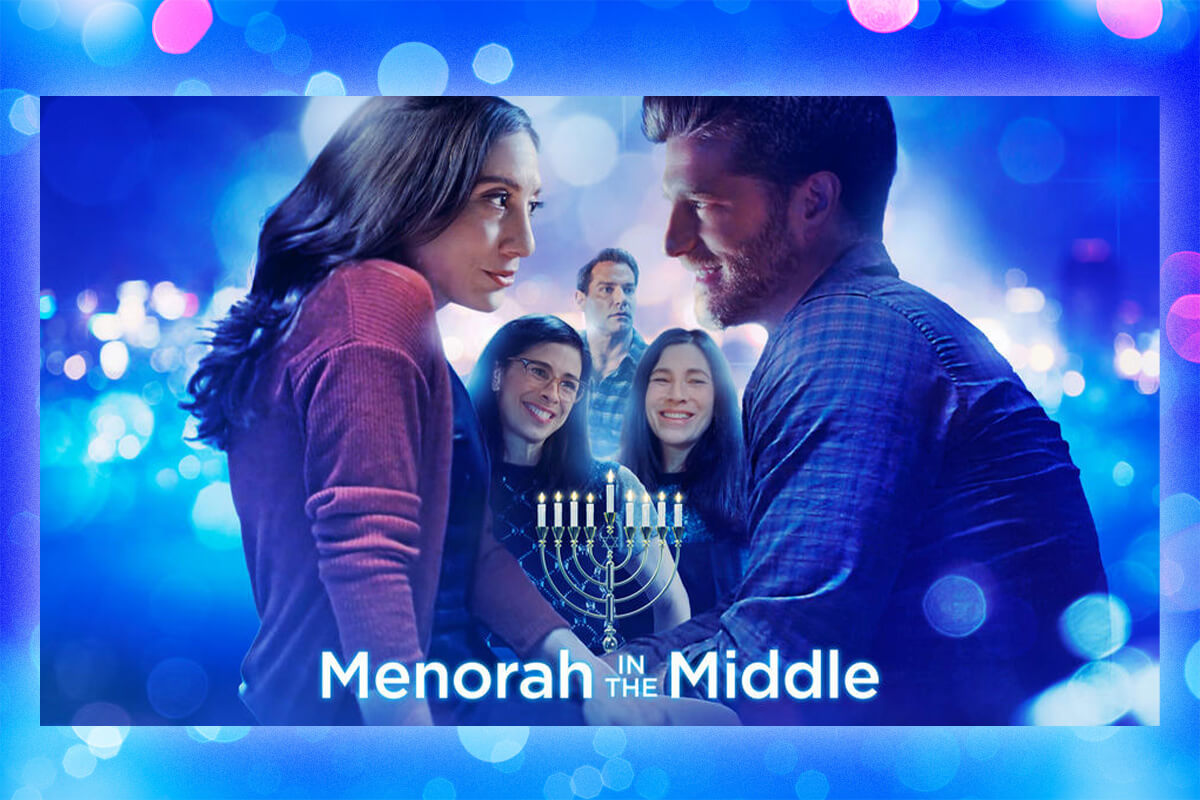This new Hanukkah movie isn’t very deep, but you can’t say it isn’t very Jewish
‘Menorah in the Middle’ is cheesy and over the top, sure, but unlike many Hanukkah movies, the Jewishness feels authentic

Graphic by Angelie Zaslavsky
Holiday movies aren’t supposed to be good. Sure, there are exceptions, like It’s a Wonderful Life, but the genre isn’t generally about cinematography or sharp dialogue or big issues, and they’re not trying to win over critics or awards. Holiday movies are meant to go down easy and be comfortingly predictable, and get you into the holiday spirit.
Hallmark movies are an aesthetic unto themselves, a particularly unabashed level of rom-com cheesiness combined with an incredibly low budget, all filmed at a rapid pace. And, it turns out, they do not even need to be made by the Hallmark Channel — this year, there’s a new entry in the genre from Hulu, starring Jonah Platt and Lucy DeVito, and featuring cameos from Sarah Silverman and her sister Laura.
Menorah in the Middle follows a classic holiday rom-com template: Girl who moved to the big city comes home for the holidays with her fiancé — but when she sees her high school sweetheart, she’s swept off her feet. A love triangle ensues.
Of course, because it’s Jewish, the quaint hometown is a fictional Southern California town called Sol Viejo instead of a fictional small town in the Midwest. And there’s the added tension of fiancé “Chad the Goy” saying Hanukkah with a hard “ch.” The hometown boy, Ben — played by Platt — is, of course, Jewish.
Soon, though, the movie pivots away from the Chad-Ben competition to focus on the fact that the Becker family’s bakery, beloved for its rugelach and challah, is nearly bankrupt, and they need to raise $40,000 by the end of Hanukkah.
The plot is not unlike the real life experience of filming the movie.
Producers reached out to director Jordan Kessler about directing a Hanukkah movie, but Kessler didn’t think the film was authentically Jewish, Platt told me over the phone. “They were like alright, you can rewrite it, you have six days,” he said.
They filmed the movie in just 10 days, at the end of the summer, and Kessler had around a week to edit the results. Menorah in the Middle began streaming on Hulu in November.
“It definitely felt a little down and dirty, for sure,” Platt said.
Is the resulting movie good? Absolutely not. The opening scene, set in Paris, looks conspicuously like soundstage. The dialogue is full of dad-level cringey jokes and there’s a random, off-key man who sporadically narrates scenes in song. It’s so over the top, I think it must be a meta-commentary on the genre.
But even if it is, that’s not the point. Cheesy movies and predictable rom-coms are like a warm embrace for those who love them, not a rich text to interpret. And Menorah in the Middle is made for the Jews who so rarely get a holiday cheesefest of their own to watch on a snowy night on the couch.
“People were very psyched to get to be making something that there isn’t a lot of, that they felt like they would enjoy, their friends and families would enjoy,” Platt said of filming a Hanukkah movie. “You know, a contribution to the canon.”
Of course there’s still plenty of exposition for the non-Jews — Chad the Goy’s, well, goyishness provides a good opportunity to do some heavy-handed explaining, like how long Hanukkah is and why the date moves around each year. No movie could succeed if it only catered to Jews, after all; there’s not enough of us.
Still, the movie manages to really feel Jewish — because all of the cast and the director actually are. “Jordan was Jewish, all of the actors were Jewish,” Platt said. “We didn’t have to try to be authentic, it just was because we were all Jews doing our thing, you know?”
Sure, some of the Jewishness is from liberal usage of Yiddish terms like kibitz and meshugas. A lot of it, however, is from authentic references about camp or Jewish geography. (“Shayna S.! Yeah, you ever talk to Shayna L.?” Platt, who went to Camp Ramah in real life, ad-libs in one scene.)
But it’s never possible to totally overcome the Christian hegemony in holiday movies. As I watched Menorah in the Middle, subtitles on, I noticed there were some mistakes in the transcription. “Challah” was rendered as “[indistinct]” in one instance and “color” in another. “Mensch” became “munch” and “latkes” became “locusts.”
“That’s very funny,” said Platt, when I told him about the subtitling. “But also very lame.”
Correction: A previous version of this article misstated the setting of the movie. The movie is set in the fictional town of Sol Viejo, not San Diego.
















